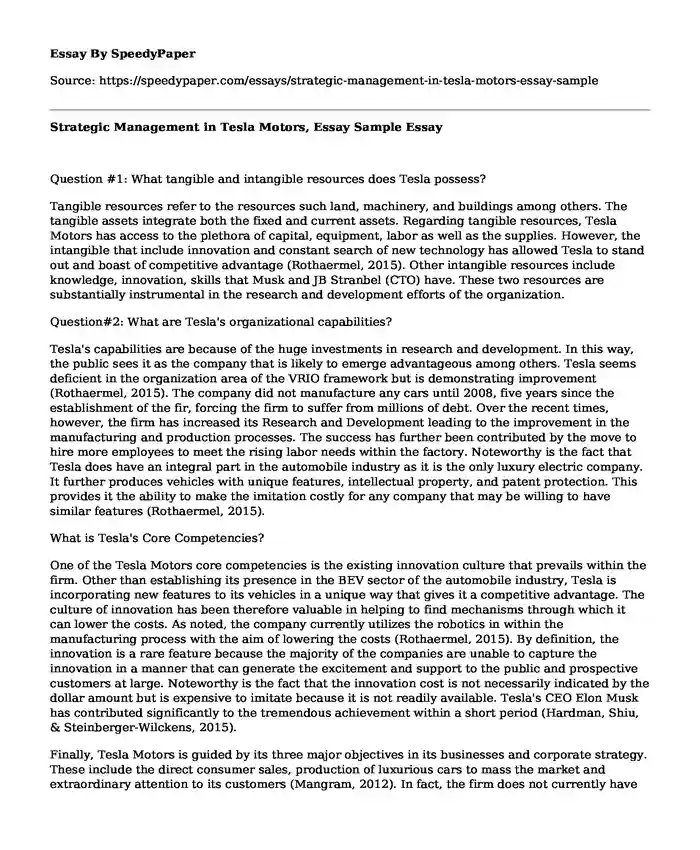
| Type of paper: | Essay |
| Categories: | Tesla Strategic management |
| Pages: | 3 |
| Wordcount: | 640 words |
Question #1: What tangible and intangible resources does Tesla possess?
Tangible resources refer to the resources such land, machinery, and buildings among others. The tangible assets integrate both the fixed and current assets. Regarding tangible resources, Tesla Motors has access to the plethora of capital, equipment, labor as well as the supplies. However, the intangible that include innovation and constant search of new technology has allowed Tesla to stand out and boast of competitive advantage (Rothaermel, 2015). Other intangible resources include knowledge, innovation, skills that Musk and JB Stranbel (CTO) have. These two resources are substantially instrumental in the research and development efforts of the organization.
Question#2: What are Tesla's organizational capabilities?
Tesla's capabilities are because of the huge investments in research and development. In this way, the public sees it as the company that is likely to emerge advantageous among others. Tesla seems deficient in the organization area of the VRIO framework but is demonstrating improvement (Rothaermel, 2015). The company did not manufacture any cars until 2008, five years since the establishment of the fir, forcing the firm to suffer from millions of debt. Over the recent times, however, the firm has increased its Research and Development leading to the improvement in the manufacturing and production processes. The success has further been contributed by the move to hire more employees to meet the rising labor needs within the factory. Noteworthy is the fact that Tesla does have an integral part in the automobile industry as it is the only luxury electric company. It further produces vehicles with unique features, intellectual property, and patent protection. This provides it the ability to make the imitation costly for any company that may be willing to have similar features (Rothaermel, 2015).
What is Tesla's Core Competencies?
One of the Tesla Motors core competencies is the existing innovation culture that prevails within the firm. Other than establishing its presence in the BEV sector of the automobile industry, Tesla is incorporating new features to its vehicles in a unique way that gives it a competitive advantage. The culture of innovation has been therefore valuable in helping to find mechanisms through which it can lower the costs. As noted, the company currently utilizes the robotics in within the manufacturing process with the aim of lowering the costs (Rothaermel, 2015). By definition, the innovation is a rare feature because the majority of the companies are unable to capture the innovation in a manner that can generate the excitement and support to the public and prospective customers at large. Noteworthy is the fact that the innovation cost is not necessarily indicated by the dollar amount but is expensive to imitate because it is not readily available. Tesla's CEO Elon Musk has contributed significantly to the tremendous achievement within a short period (Hardman, Shiu, & Steinberger-Wilckens, 2015).
Finally, Tesla Motors is guided by its three major objectives in its businesses and corporate strategy. These include the direct consumer sales, production of luxurious cars to mass the market and extraordinary attention to its customers (Mangram, 2012). In fact, the firm does not currently have any partnership with the external dealers to distribute its products but instead uses its showrooms and online platform to conduct the distribution its cars to the consumers. As a direct approach, this selling strategy is implemented for high-quality products and further distinguish its products from other competitive brands from other companies. The use of own showrooms are representatives also facilitates the understanding of the unique features of the vehicles produced instead of depending traditional salesman to offer them representation.
References
Hardman, S., Shiu, E., & Steinberger-Wilckens, R. (2015). Changing the fate of Fuel Cell Vehicles: Can lessons be learnt from Tesla Motors? International journal of hydrogen energy, 40(4), 1625-1638.
Rothaermel, F. T. (2015). Strategic management. McGraw-Hill Education.
Mangram, M. E. (2012). The globalization of Tesla Motors: a strategic marketing plan analysis. Journal of Strategic Marketing, 20(4), 289-312.
Cite this page
Strategic Management in Tesla Motors, Essay Sample. (2022, Mar 23). Retrieved from https://speedypaper.com/essays/strategic-management-in-tesla-motors-essay-sample
Request Removal
If you are the original author of this essay and no longer wish to have it published on the SpeedyPaper website, please click below to request its removal:
- Free Essay Example about Glycemic Control
- Free Essay Sample on the Importance of Human Resource Management in a Company
- Essay Sample on Effects of Automobile
- Free Essay Sample on Evolution and Religious beliefs
- Free Essay - Factors Affecting Internet Use in American Population
- Essay Example: Big Data and Social Media
- Culture is Key: The Missing Piece to Business Success
Popular categories




